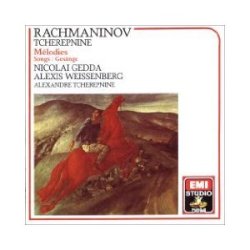Rachmaninov - Melodies (1993)
Rachmaninov - Melodies (1993)

1. Reponse - Op. 21 No. 4
2. Chanson georgienne - Op. 4 No. 4
3. Les Lilas (The Lilacs) - Op 21 No. 5
4. Ne me regrette pas (I regret nothing) - Op. 14 No. 8 play
5. Le Tempete (The Storm) - Op. 34, No. 3
6. Aux enfants (To the children) - op. 26, No. 7
7. Le Christ renait (Christ is Risen) - Op. 26, No. 6
8. Dans mon jardin je vois - Op. 26, No. 10
9. Lorsque la nuit m'entoure - Op. 4 No. 3
10. Vocalise - Op. 34, No. 14
11. Tout est si beau - Op. 21, No. 7
12. Un fragment d'Alfred de Musset - Op. 21 No. 6
13. Arion - Op. 34, No. 5
14. Ce jour d'extase - (This Day of Ecstasy) Op. 34 No. 10
15. Bles dores, moisson vaste - Op. 4 No. 5
16. Une brise passe - Op. 34 No. 4
17. Les eaux du printemps - Op. 14 No. 11
Tcherepnine - Songs
18. Le fac du Taar, Op. 16 No. 3 / 2 Legendes mystiques, Op. 50 play
19. Trois Tombeaux
20. Mere solitude
21. Le Bouleau, Op. 33 No. 14
22. Chant d'automne, Op. 7 No. 1
23. La bougie s'est éteinte, Op.21 No. 3
Nicolai Gedda – tenor
Alexis Weissenberg – piano
This one was one of the most original reissues in EMI's mid-price Studio line from the late 1980s and early 1990s : the songs of Rachmaninoff are not the most noted part of his output. As for Tcherepnin, you need to delve deep into the liner notes to find out which one it is : father and Russian (then French-emigre) Romantic Nicolai (1873-1945) or French- then US emigre and more modernist son Alexander (1899-1977). Seing who plays the piano - Alexander - I was in fact led into thinking that it was his compositions. Wrong shot : they are dad's (the original LP, EMI C065 14028, also included songs of Alexander). Anyway, father or son, their respective output is all but unknown, except by specialists of the off-the-beaten track.
Rachmaninoff's songs are all you expect of that composer: arch-romantic, mostly salon-like, plangent, sentimental - even if you don't speak Russian, you hear lots of « lyubyu » and derivations, and there are at least three words that every amateur of Russian opera will know even when they don't know a word of Russian : boje (God), smert (death) and lyubyu (love) ; and what other words do you need to know to master any language ? Occasionally they will rise to the desperately vehement (track 9 In the Silence of the Night, track 12 Fragment of Altered De Musset, track 15 The Harvest of Sorrow after Tolstoy) or the dramatic and heroic (track 5 The Storm on a Pushkin poem, track 13 Arion, track 17 The Floods of Spring). And you don't usually hear the Vocalise op 34/14 (track 10) sung by a tenor, although it is, indeed, specifically written for soprano or tenor. At its best the piano writing is in the league with the best piano writing of Rachmaninoff, that from the Preludes, Sonatas, Etudes-Tableaux. At its not so best it is Russian salon-like and sentimental.
Swedish-born but Russian-raised Nicolai Gedda (« born in Stockholm to a Swedish mother and a half-Russian father, Gedda was raised by his aunt Olga Gedda and his adoptive father Mihail Ustinov (a distant relative of Peter Ustinov), who sang bass in the Don Cossack Choir Serge Jaroff and was cantor in a Russian Orthodox church" says the invaluable people's-processed and free except for those who donate internet encyclopedia) sounds arch-genuine Russian to me and sings valiantly, with exquisitely controlled pianissimo head voice in the higher reaches (Walter Legge was impressed by it in the final upward scale of Carmen's Flower song when he first auditioned the unknown young singer in Stockholm in 1948) and benefits from the outstanding and star-studded support of Bulgarian Alexis Weissenberg (in Rachmaninoff) and Alexander Tcherepnin. ---Discophage
download: uploaded yandex 4shared mediafire solidfiles mega filecloudio nornar ziddu
Last Updated (Saturday, 29 March 2014 13:25)








